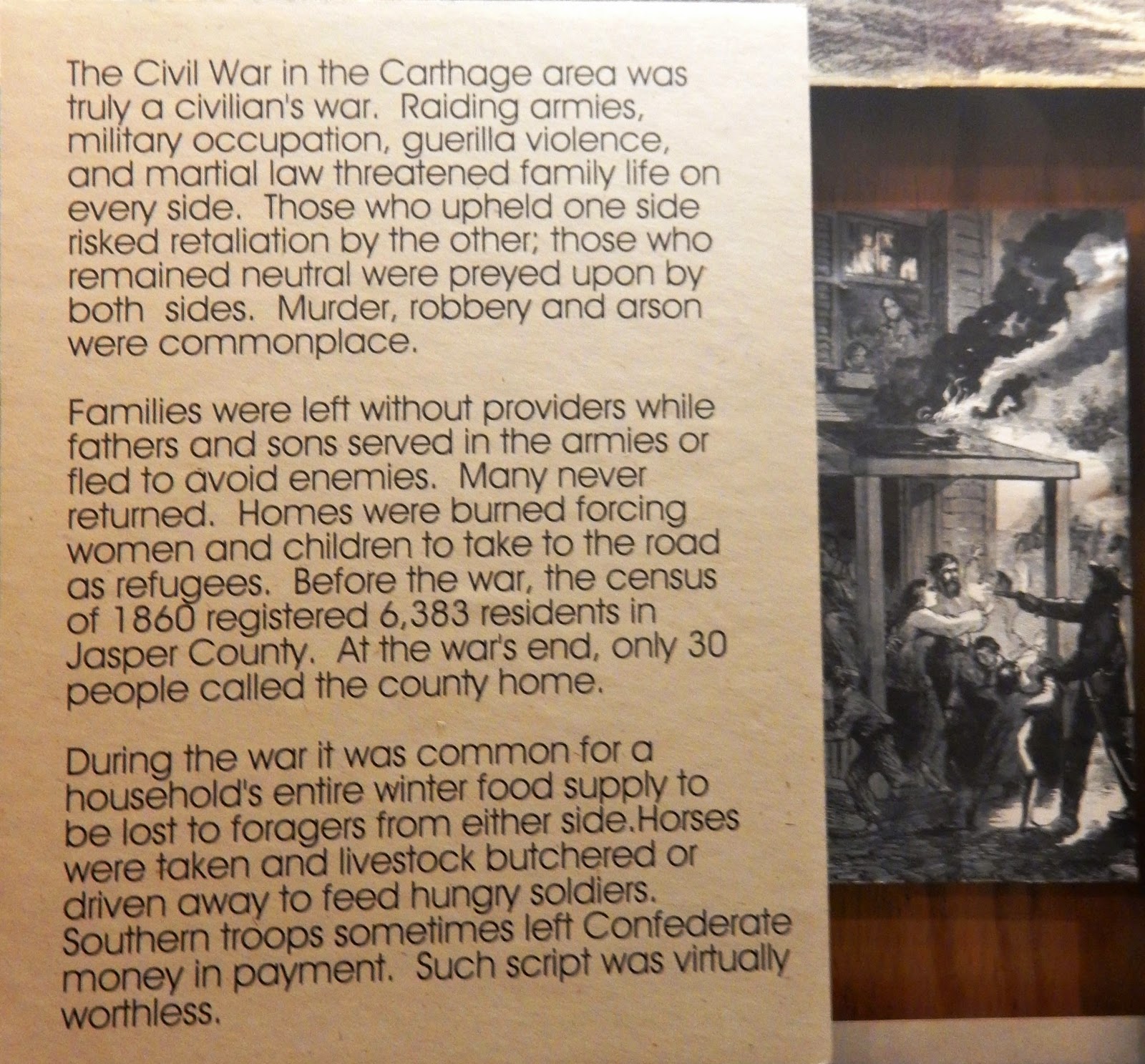The pretty
town with the huge gothic courthouse is Carthage, Missouri (Pronounced Missoura to anyone from Missouri).
It lies just northeast of the farming
city of Joplin, which was struck so recently by a horrendous tornado, and a half hour south of the home of President
Harry S. Truman’s birth, Lamar. You’d never know that once this town was rent
by something much more frightening than a tornado: sectarian hate.
Before the
Civil War, in 1860, over 6,000 called Jasper County and Carthage home. By war’s end, in 1965, less than 30 lived
here.
The town,
and much of the Kansas-Missouri borderland, was bloodied well before the war
began as ‘free-staters’, who wanted no slaves to be allowed in the new state of
Kansas, and ‘states-righters’, who wanted the federal government to keep its
hands off a local state’s decisions, fought to the death in personal, and
sometimes gang, warfare. By the time actual war was declared between north and
south much of Missouri already looked like Syria looks today. And like the
Syrian Muslims, these fighters all believed God was on their side.

 We visited
the site of the First Battle of Carthage today, where Union Troops from anti-slavery
St. Louis under a successful German
immigrant commander, Franz Sigel were driven back through town by Confederates led
by former Governor Jackson whom President Lincoln had had removed from office.
We visited
the site of the First Battle of Carthage today, where Union Troops from anti-slavery
St. Louis under a successful German
immigrant commander, Franz Sigel were driven back through town by Confederates led
by former Governor Jackson whom President Lincoln had had removed from office.
But the real
destruction of the county occurred after the Union had won Missouri for the
Union. It was then that President Jefferson of the Confederacy authorized certain
officers of the former Missouri Confederate troops to create bands of guerillas
to fight behind Union lines.
 If these
bands had kept to strictly military targets perhaps they would have written
just another chapter in America’s war, but these groups were often led and made
up of neighbors of pro-Union families who they had personal reasons for hating
as well as political. And so, in addition to destroying US Army materiel, they
attacked, burned, and destroyed the lives of persons they felt had wronged them
in the past. Even Carthage itself was
eventually burned to the ground.
If these
bands had kept to strictly military targets perhaps they would have written
just another chapter in America’s war, but these groups were often led and made
up of neighbors of pro-Union families who they had personal reasons for hating
as well as political. And so, in addition to destroying US Army materiel, they
attacked, burned, and destroyed the lives of persons they felt had wronged them
in the past. Even Carthage itself was
eventually burned to the ground.
So much for
my civil War history lesson today. The rest
of my pics from the Carthage Civil War Museum, and the story of the lusty and
rebellious Belle Starr, of Carthage, of course, will be on Facebook.
------------------------------------------------------------------------------------------------------------
 Outside of Carthage,
just a few miles north in the midst of fields and farms is a less well known
but much newer historical byway & byline.
Red Oak II, created from the little dying town of Red Oak, about 20
miles away.
Outside of Carthage,
just a few miles north in the midst of fields and farms is a less well known
but much newer historical byway & byline.
Red Oak II, created from the little dying town of Red Oak, about 20
miles away. The Carthage
area artist Lowell Davis, after making it big in the big time of alternative art
forms decided to lift up the best parts of his childhood memory that were now
empty and rotting in the Old Route 66 village of red Oak, Missouri, and move
them, with some touches of creative and whimsical humor of his own, onto his
own farm on Kafir Road.
The Carthage
area artist Lowell Davis, after making it big in the big time of alternative art
forms decided to lift up the best parts of his childhood memory that were now
empty and rotting in the Old Route 66 village of red Oak, Missouri, and move
them, with some touches of creative and whimsical humor of his own, onto his
own farm on Kafir Road.  Today this
free and wide open sort of museum (though folk live in some of the homes now)
and lifesize artwork (sort of Davis’ own hundred
acre wood) is just what he wanted it to be.
A pleasant jaunt back in time with a little of the movie Beetlejuice added in for fun.
Today this
free and wide open sort of museum (though folk live in some of the homes now)
and lifesize artwork (sort of Davis’ own hundred
acre wood) is just what he wanted it to be.
A pleasant jaunt back in time with a little of the movie Beetlejuice added in for fun.
Don’t miss
it if you ever get to southwestern Missoura!
-Ken






No comments:
Post a Comment